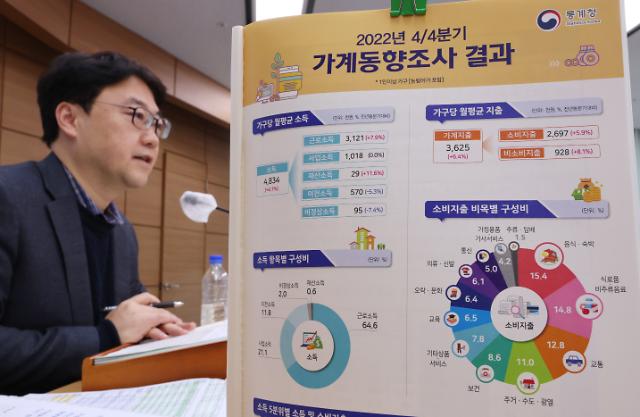
Lee Jin-seok, an official in charge of household data at Statistics Korea, holds a media briefing to release household income and spending data at the Government Complex in Sejong City, February 23. [Yonhap]
The statistical office said that average nominal household income increased 4.1 percent to 4.83 million won in the last three months of 2022 from a year before. However, inflation-adjusted real household income dropped 1.1 percent, following a 2.8 percent fall in the third quarter of last year.
"Inflation-adjusted real household income decreased in the aftermath of soaring inflation last year," said Lee Jin-seok, a statistical official in charge of household income data, said.
In the meantime, average household spending jumped 6.4 percent year-on-year to 3.62 million won in the fourth quarter. However, inflation-adjusted real household spending edged up a mere 0.6 percent.
The data indicated that consumers tightened their purse strings as their purchasing power shrank due to runaway inflation.
The cost of living surged due to a 6 percent increase in housing expenses, utility charges and heating bills. Average household spending on energy such as electricity and gas jumped 16.4 percent in the fourth quarter, marking the highest quarterly increase since Statistics Korea began to compile related data in 2006.
Transportation expenses also soared 16.4 percent as fuel costs for automobiles climbed 9.1 percent. Airfares in particular skyrocketed 56.5 percent.
In addition, spending on leisure and entertainment increased sharply by 20 percent on the back of the lifting of COVID-19 social distancing rules and business restriction. Expenditure on dining and lodging climbed 14.6 percent. Education spending rose 14.3 percent.
Households' payment of interest shot up 29 percent due to soaring interest rates. Average non-consumption spending such as tax and interest payments climbed 8.1 percent year-on-year to 928,000 won per household.
Copyright ⓒ Aju Press All rights reserved.
